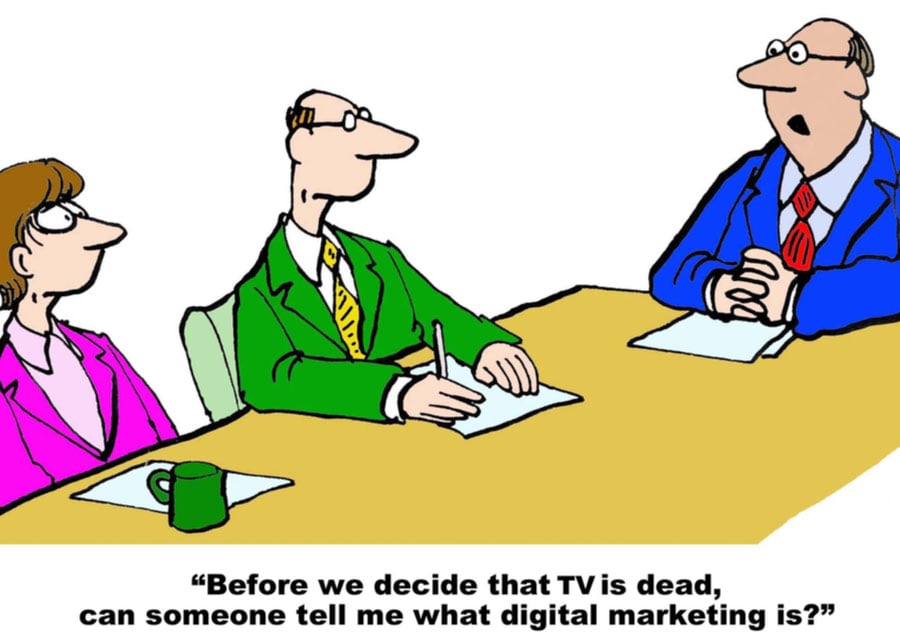What Are the Best B2B Digital Marketing Strategies?
The B2B marketing approach has changed, placing a strong emphasis on digital tactics. In fact, if you’ve stuck your head in the sand to avoid facing digital marketing, it’s probably time for you to lookup. And that can be scary.
Although it might seem difficult to navigate the best approach or best B2B digital marketing strategies, the successful marketing of your product or service requires a basic understanding of technology. Oof. That might sound even worse. But think of it more as an ongoing evolution that you can kind of move with. It’s very fluid and non-threatening. All you have to do is be ready to adapt to meet the expectations of your target audience. And you know them, so you got this!
So, what are the best marketing strategies for you? Here are the best B2B digital marketing strategies you should embrace.
Pay Attention to Your Website
Websites today can’t be static. Instead, you have to keep providing engaging, educational content that not only teaches people about your brand but, more importantly, gives them information about the industry to show off your expertise.
So, your website should:
- Provide useful solutions to resolve potential customers’ pain points
- Allow you to collect data to grow and even nurture sales leads
- Be directed at your target audience
- Be mobile-friendly and device responsive
- Be filled with easy-to-find calls to action
- Provide useful industry content of different levels from blogs to detailed white papers
- Provide links to social media
- Contain both evergreen and up-to-date content
Think of your website as the base camp for your digital marketing. You can direct people there from your other marketing efforts. Make sure you’ve got informative landing pages designed to force them down the sales funnel, and you’re good to go.
Don’t Underestimate Content
Content is not only the lifeblood of your digital marketing strategy but also the key to the success of your SEO. SEO? Oh no. SEO sends new visitors to your site so that you can grow your business. It sounds hard, but you need it to move your site up in the rankings. And yes, it does require some SEO know-how. You will have to be savvy about keyword strategies or work with someone who can help in this area.
Some content ideas include:
- A regularly updated blog
- White papers, case studies, and eBooks
- Guest articles from industry experts
- Engaging, instructional, and meaningful video
- Infographics or at-a-glance answers
- Landing pages with strong CTAs
Get Social
Social media takes a lot of effort, but it’s worth it. Like your website, social media has grown to be a major digital resource. But it doesn't need just original information. Your other content provides excellent post opportunities. You can simply post links to your existing content with clever CTAs as lures.
Also, don’t kill yourself trying to be on every social platform. You can choose a few, such as Instagram, Facebook, and LinkedIn. Your posts can include:
- Industry tips
- Links to industry articles
- Solutions to issues, including links to your own content
- New product and service info
- Positive client comments and stories
- Video testimonials
- Instructional video links
Just keep things entertaining and useful, without too much of a "salesy" feel. Sales tactics are a big turn-off for social followers. Think community first, leads second.
Invest in Budget-Friendly PPC
A pay-per-click (PPC) campaign can prove to be an affordable way to ramp up your digital marketing efforts. You can choose your budget, set it, and then put an end to it once you’ve reached your spend. This is a great way to get some people to your site and jumpstart SEO.
Integration With Old School Ads
You don’t have to focus strictly on digital marketing. If you’ve run successful offline marketing campaigns, keep it up. Just make sure to leverage your online efforts. Provide contact info, including your website and social media links. Also, use your social media as a recommended way to reach you if you’re using it as a customer service option.
Integration should also be applied across all your online efforts so that everything ties in together logically. This goes back to your landing pages. They can prove to be one of your most useful tools based on the “all roads lead to Rome” premise. Not only is it useful for customers but also useful as your analytics tool to test the success of campaigns.
Remember Your Targets
Always keep asking yourself, “What are marketing strategies for?” This will keep you focused on your targets. The targets you set will impact your digital marketing success. Refining your targets is worth it as it gets rid of the people who tend to bog down your pipeline. It will allow you to have an effective way to qualify leads before they even reach your pipeline.
And don’t panic; social media and Google ads both offer effective targeting tools. They are also flexible, allowing you to fine-tune them if you find your ads aren’t getting the results you want. You can then use analytics to look for opportunities to see how effective your marketing is based on your targets.
Track and Rethink
Keep a list of your digital assets so that you can keep track of them. Then, pay attention to the analytics provided to see how well they are working. In some cases, you might already know based on new leads and sales closed. But not all marketing is directed at sales. (What? Yes, you might just want to build your brand for some of the stuff you’re working on amongst other things). Just try to take a look as often as possible so that you can see how things are working for your marketing approach based on visitors, clicks, shares, and likes.
Budget, Plan, Analyze, and Plan Again
Along with your tracking, you should know what assets are out there, which ones are working, which ones aren’t, and which ones deserve some further investing. By first setting a budget, you can allot money towards each tactic. You can then track each tactic to determine which ones are successful and then plan your next steps.
You should have a calendar marked up with all your best marketing strategies, including:
- Title/topic of your content
- Where each post will appear
- Date of posting
- Crossover opportunities for content (i.e. a new blog to be posted on a social page)
- PPC campaigns
- Who is responsible for providing the content?
Your calendar will make sure you don’t lose track of anything or allow you to miss opportunities.
These are the best B2B digital marketing strategies to provide you with an effective digital marketing plan. If you’re still feeling nervous, you might need a bit of assistance from a digital marketing pro.
Related Articles:
Table of contents
Share this
You May Also Like
These Related Stories

What Are Good Sources to Learn About B2B Content Marketing?

Why B2B Companies Should Be Using Pay Per Click Marketing


